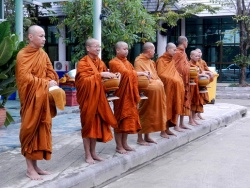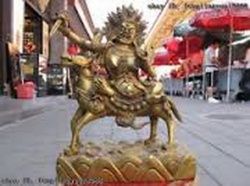Martial arts fraud victims
Many intelligent and well-educated individuals fall victim to martial arts fraud and the worthless claims of pseudo-masters. Victims usually have one or more of the following vulnerabilities:
- Lack of suspicion. Many people believe that if something is printed or broadcast, it must be true or somehow its publication would not be allowed. People also tend to believe what others tell them about personal experience or what they find on the Internet. The mass media provide much false and misleading information in advertisements, news reports, feature articles, and books, and on radio and television programs. News reports often sensationalize, stimulate false hopes, and arouse widespread fears. Many radio and television producers who promote unsubstantiated claims say they are merely providing entertainment and have no ethical duty to check out the claims. Just because a pseudo-master appeared in an article in a martial arts magazine does make him or her legitimate.
- Belief in magic. Some people are easily taken in by the promise of an easy solution to their problem. Those who believe there is some magic touch that will immobilize an attacker fall into this category. Have you ever seen a standing person faint or a boxer knocked out by a blow? The person just goes limp, immediately collapses, and the head bounces on the floor. When you watch a demonstration of a pseudo-master using a simple touch to incapacitate an person, watch the "incapacitated" person as he or she falls to the floor. They make a controlled fall and the neck is stiff to keep the head from hitting the floor. Unconscious people do not have control of their bodies so they cannot do these things to protect themselves.
- Overconfidence. Despite P. T. Barnum's advice that one should "never try to beat a man at his own game," some strong-willed people believe they are better equipped than experts to tell whether a pseudo-master is telling the truth.
- Desperation. Many people faced with an immediate physical safety problem are susceptible to false claims by pseudo-masters. These people do not have the time or desire to train for months or years; they just want a quick fix; so they fall victim to claims of secret, easy to use self-defense techniques.
- Alienation. Some people feel deeply antagonistic toward traditional ways; they are attracted to things represented as "natural" or otherwise unconventional. These people may also harbor an extreme distrust of the establishment in general.
- Endorsement. Some martial arts use endorsements from prominent athletes to promote their arts. Just because a prominent person endorses martial art, it does not mean it will work as advertised. Do not assume that the art was responsible for an athlete's success or that using the art will turn you into a champion. The major ingredient in athletic success is hard work. Some martial arts sponsor athletic teams or athletic events (such as the Olympic Games) to promote their arts. That, too, should not be interpreted to mean that the arts improve athletic performance. Just because a magazine, newsletter, or web site has an editorial advisory board, that does not guarantee that its contents are trustworthy. Legitimate arts do not need endorsements, and few legitimate martial artists are willing to provide them. Many endorsers seldom pay attention to how arts they endorse are marketed and many editorial advisory boards have little to do with what gets published.
- Media. Some low-quality magazines carry one or a few high-quality columns written by a reputable professional. Do not assume that because some writers are reputable, other information in a magazine must be valid. The fact that a publication has a prominent editorial board is a plus, but do not assume that the board members read the articles or approve of the ads or that the people listed are reputable simply because they have a title or degree or that the board influences what is published. In many cases, they do not.
- Coincidence. Coincidences occur every day in everyone's life. Some are trivial, as when two people reaching for a door at the same time, but others grab our attention, as when you are thinking of a friend only to have them call you on the phone moments later. What these events have in common is our intense desire to explain them, a belief that there is a special reason things happen the way they do. What most people do not know or do not want to believe is that most coincidences, even remarkable ones, are merely inevitable occurrences with no special significance at all. There are many simple reasons why most people misinterpret coincidences:
- We have a poor innate grasp of probability.
- We believe that all effects must have deliberate causes.
- We do not understand the laws regarding truly large numbers.
- We easily succumb to selective validation, the tendency to remember only positive correlations and forget the far more numerous misses.
People with a poor understanding of probability and statistics, which is most people, are more amazed than they should be when confronted with coincidences, hence, they jump to metaphysical explanations. They tend to believe in the mystic powers of the pseudo-masters. Some believe to the extent that they become followers of a pseudo-master and become part of a cult.
The true significance of bizarre coincidences may be understood more fully with what is called the law of truly large numbers. This widely accepted law of statistics states that with a large enough sample size, even the extremely unlikely becomes likely, and therefore, any outrageous event may occur. When enough people are involved, "unusual" occurrences become highly probable.
Human memory is not like a tape recorder, faithfully recording everything experienced. Dramatic experiences tend to be remembered more than others. This leads to a phenomenon called subjective validation, more commonly known as selective memory. Therefore, it is only natural to remember unusual experiences. Returning to our friend who calls soon after you think about him, this event becomes much less extraordinary if we consider how many times we have thought of friends who did not call.
A common ploy used by psychics is to make dozens of predictions knowing that the more that are made, the better the odds are that one will be correct. When one comes true, the psychic counts on us to forget conveniently the 99 percent that were incorrect. This makes the correct predictions seem much more compelling than they really are.
Our coincidence-detection abilities have been finely honed through the ages by evolution and natural selection. Being able to spot significant correlations between events would present an important survival advantage to our ancestors, which would then be passed through the generations. We may therefore speculate that man is hardwired to look everywhere for patterns and connections. Modem culture, however, with its myriad connections between events and people, activates these abilities at every turn, causing us to continually suggest explanations and invoke strange forces, such as psychic powers, that do not exist.
Not all coincidences are meaningless and should be ignored. Truly unlikely events may have some underlying significance. However, the vast majority of coincidences that we experience turn out to be much more probable than they appear.



